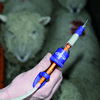Further cattle test positive for bluetongue

Cattle in Somerset have tested positive for the bluetongue virus, Farmers Weekly interactive has learned. As with the recent four cases of bluetongue in the UK the virus has been found in animals imported from continental Europe.
It is the second time in two days that imported cattle have arrived in Britain.
FWi also understands that there are four to five further premises under investigation in areas as diverse as Somerset, Worcestershire and Cumbria.
The information was passed to FWi by a source who has requested to remain anonymous.
The source added that there was also a brewing controversy over a further batch of cattle en route from France to farms in Scotland.
The cattle have been turned away by the Scottish authorities and are now being held on the English side of the border, the source said.
While there is no reason to presume that the animals are infected with bluetongue, of great concern is that the cattle have been imported from an area in the south west of France which is under surveillance for the BTV1 strain of the bluetongue virus.
Earlier the president of the British Cattle Veterinary Association (BCVA), Carl Padgett, pleaded with farmers not to import from mainland Europe at this time.
His plea followed the import of 18 bluetongue infected cattle from Germany by Keith Wilkinson of Carrsides farm, Rushyford near Bishop Auckland, County Durham.
Mr Wilkinson imported the animals after they were given a clean bill of health in their native country – only to test positive for the disease once they were in the UK.
The animals will be under restriction until October but Dr Padgett questioned why DEFRA had decided to contain the 18 animals, rather than remove them.
“I question if DEFRA is choosing an eradication or a control policy. These animals pose a massive risk to our currently – hopefully – uninfected midge population,” he said.
If British midges do become infected, bluetongue would spread through the country uncontrollably, as it has done on mainland Europe, Dr Padgett warned.
